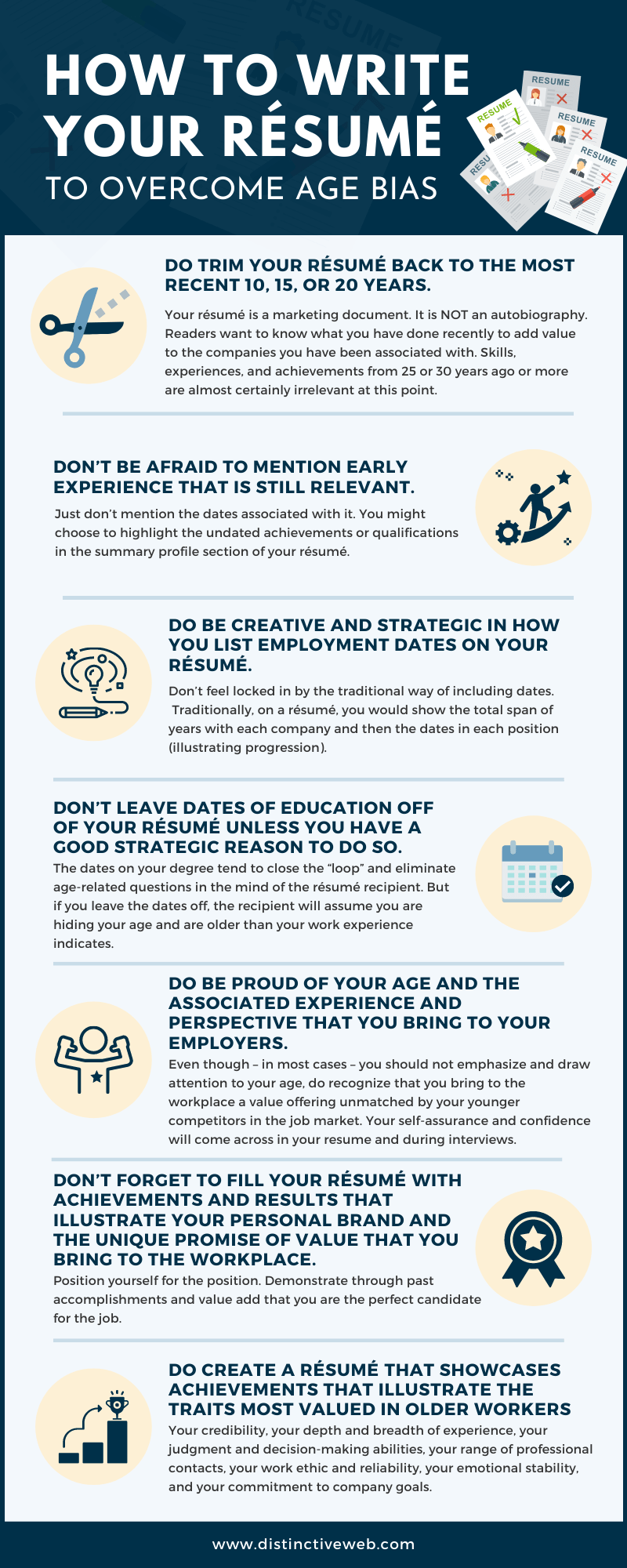
How should you handle the issue of age on your resume?
“Should I reveal it or not?”
“I’ve been told that my resume should only include the last ten years of my work experience. Is this true?”
“My resume includes experience from 18 years ago and I’m worried that age discrimination might be an issue. How do I handle age on my resume?”
These are common questions that more “seasoned” job hunters ask as they begin to think about writing or updating a resume for a job application.
What does this mean for you? How do hiring managers look at age on a resume?
The truth is that there is no single “correct” way to handle revealing (or not) age on your resume, and the best strategy for you should be chosen based on the big picture of your experience and career goals.
But, if you are an over 50 job hunter you shouldn’t just ignore the issue. Age discrimination in the job market is a real thing.
Unfortunately, many job seekers unintentionally emphasize age in job applications simply because of how they structure and write their resume–including information that showcases rather than downplaying age. Here are some tips on how to handle age on your resume to overcome age bias and associated challenges.
DO trim your resume back to the most recent 10, 15, or 20 years.
Your resume is a marketing document. It is NOT an autobiography and you do not need to include details in your job application that might add to age discrimination. Hiring managers want to know what you have done recently to add value to the companies you have been associated with. Skills, experiences, and achievements from 25 or 30 years ago or more are almost certainly irrelevant at this point. But, if those early experiences are still relevant, you do have options…
DON’T be afraid to mention early experience that is still relevant.
While it is true that the potential employer will be most interested in your most recent experience during the hiring process, there is often value in including experience further back in your history, even if you choose not to reveal age on your resume fully.
- Perhaps your early career includes work for well-known, prestigious companies.
- Perhaps you want to document the full scope of your cross-industry experience, much of which occurred in your early career.
- Perhaps you believe some valuable networking opportunities may come out of your experience 15 or 20 years ago.
- Or perhaps your most impressive accomplishments were in a position you held 12 years ago.
In any case, if your career history is lengthy, it will be apparent to the hiring manager that your career did not suddenly materialize ten years ago, so there is little harm and many benefits to summarizing this early experience. Think carefully about the content of your resume. If there is solid reasoning behind your desire to present early experience, do so. Ever-mindful of age-based discrimination, whether or not to provide evidence of age on your resume should be a strategic decision.
Of course, this does not mean that you must give equal page weight to your early career.
Also, don’t mention the dates associated with it. You might choose to highlight the undated achievements or qualifications in the summary profile section of your resume. Or, another effective strategy is to summarize that experience at the end of your resume. Your description should be concise. Just one or two sentences that begin with the words “Additional experience includes…” will usually suffice.
Here are some possibilities for formatting that mention on your resume of early experience if you determine it is important to your current goals, but do not want to include dates that could add to age discrimination.
If the company names are prominent and important based on your current goals:
EARLY CAREER: Recruited out of college into highly competitive leadership and management training program at Acme Corporation; personally mentored by division managers, rotating over a period of three years through a variety of company divisions and geographic locations. Identified early on as a high-potential future leader and was handpicked at completion of training program to takeover management of a $10 million, 28-employee department that was struggling under intense competition. Quickly restarted growth and regained competitive positioning, growing sales to $18 million in two years.
If early job titles are important based on your current goals:
OTHER EXPERIENCE: Career began as an administrative assistant, but was quickly called out and recognized for outstanding customer relations skills and natural sales abilities. At first opportunity, tapped by management for advancement into sales associate position, and over the next five years earned four more promotions, ultimately ascending to senior management as a national sales manager.
If the industries you worked in are important, but not necessarily the company names:
ADDITIONAL EXPERIENCE: Entered the restaurant industry as a new college graduate and spent the next six years advancing through progressive positions in two local-award-winning restaurants before transitioning to a supervisory role in the food and beverage department of a national-chain hotel.
DO be creative and strategic in how you list employment dates on your resume.
Don’t feel locked in by the traditional way of including dates. For example, I recently worked with an executive candidate who had three years with his current employer but more than 35 years of progression with his last employer. Traditionally, on a resume, you would show the total span of years with each company and then the dates in each position (illustrating progression).
But to overcome age bias, this method clearly wouldn’t work for this client because he began working for that last employer sometime in the mid-1980s – a date that we did not want to include on the resume. So, instead, we left off the total dates with each company and just listed dates in each position, going back approximately 15-20 years. Like this:
Employer 1, location
Current position (20xx – Present)Employer 2, location
Position a (20xx – 20xx)
Position b (19xx – 20xx)
Position c (19xx – 19xx)
Position d (19xx – 19xx)** Additional experience includes…
DON’T leave dates of education off of your resume unless you have a good strategic reason to do so.
One of the most common errors that I see is dates of education left off the resume when they should not be left off. For example, if you earned your degree 15 years ago and began working in your current career track the same year, you will actually raise questions by the hiring manager about your age by not including your graduation dates.
The dates on your degree tend to close the “loop” and eliminate age-related questions in the mind of the resume recipient. But if you leave the dates off, the recipient will assume you are hiding your age on your resume and are older than your work experience indicates.
On the other hand, if, to overcome age bias, you have shortened your resume to the most recent 10, 15, or 20 years, and your most recent degree was earned earlier than a year or two before that cut-off point, it is probably in your best interest to leave the dates off your resume.
DO be proud of your age and the associated experience and perspective that you bring to your employers.
Even though – in most cases – you should not emphasize and draw attention to your age, do recognize that you bring to the workplace a value offering unmatched by your younger competitors in the job market. Your self-assurance and confidence will come across in your resume and during interviews.
DON’T forget to fill your resume with achievements and results that illustrate your personal brand and the unique promise of value that you bring to the workplace.
Position yourself for the position. Demonstrate through past accomplishments and value add that you are the perfect candidate for the job. When your resume is filled with achievements that illustrate you will deliver a strong return on an employer’s investment in hiring you, the age factor will NOT even be an issue.
DO create a resume that showcases achievements that illustrate the traits most valued in older workers
…your credibility, your depth and breadth of experience, your judgment and decision-making abilities, your range of professional contacts, your work ethic and reliability, your emotional stability, and your commitment to company goals.
Subtly, in your resume and cover letter, touch on achievements that illustrate a high energy level, strong technical skills, and adaptability to change.
Finally, remember that you don’t have to go it alone! We are here for you and can help you write a compelling and persuasive resume that will minimize age discrimination no matter your age. Drop us a note or schedule a resume writing consultation to learn more.

Blog post originally published Aug 20, 2010. Updated and republished for 2022.
Frequently Asked Questions
What is the best way to handle age on my resume?
There is no single correct way to handle age on your resume. The best strategy should be chosen based on your experience and career goals. If you are an older job seeker, you shouldn’t ignore the issue of age. It’s important to structure your resume in a way that showcases your skills and experience, rather than emphasizing your age.
Should my resume include all of my work experience?
Your resume should focus on the most recent 10, 15, or 20 years of your work experience. It’s a marketing document, not an autobiography. The goal is to show what you have done recently to add value to the companies you have worked for. Skills, experiences, and achievements from 25 or 30 years ago are likely irrelevant at this point.
Can I include early work experience that is still relevant on my resume?
Yes, you can include early work experience that is still relevant on your resume. Even though employers are most interested in your recent experience, there can be value in including experience from earlier in your career. This could be because you worked for well-known companies, or because you want to show the full scope of your cross-industry experience.
How should I list employment dates on my resume to avoid age bias?
Be creative and strategic when listing employment dates on your resume. You don’t have to feel locked in by the traditional way of including dates. For example, if you have a long history with a single employer, you could list the dates for each position, going back approximately 15-20 years, rather than the total span of years with the company.
Should I include the dates of my education on my resume?
Whether or not to include the dates of your education on your resume depends on your specific situation. If you earned your degree 15 years ago and began working in your current career track the same year, you should include the dates to avoid raising questions about your age. However, if your most recent degree was earned earlier than a year or two before the cut-off point of your resume, it might be best to leave the dates off.
How can I show that my age is an asset in my job search?
Be proud of your age and the experience and perspective that you bring to your employers. You bring a value offering unmatched by your younger competitors in the job market. Your self-assurance and confidence will come across in your resume and during interviews. Fill your resume with achievements and results that illustrate your personal brand and the unique value that you bring to the workplace.
What traits should I emphasize on my resume as an older worker?
As an older worker, your resume should showcase achievements that illustrate your credibility, depth and breadth of experience, judgment and decision-making abilities, range of professional contacts, work ethic and reliability, emotional stability, and commitment to company goals. You should also highlight achievements that show a high energy level, strong technical skills, and adaptability to change.









